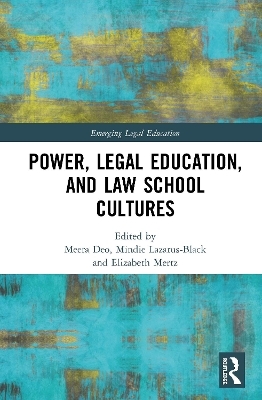
Power, Legal Education, and Law School Cultures
Routledge (Verlag)
978-0-367-19940-1 (ISBN)
There is a myth that lingers around legal education in many democracies. That myth would have us believe that law students are admitted and then succeed based on raw merit, and that law schools are neutral settings in which professors (also selected and promoted based on merit) use their expertise to train those students to become lawyers. Based on original, empirical research, this book investigates this myth from myriad perspectives, diverse settings, and in different nations, revealing that hierarchies of power and cultural norms shape and maintain inequities in legal education.
Embedded within law school cultures are assumptions that also stymie efforts at reform. The book examines hidden pedagogical messages, showing how presumptions about theory’s relation to practice are refracted through the obfuscating lens of curricula. The contributors also tackle questions of class and market as they affect law training.
Finally, this collection examines how structural barriers replicate injustice even within institutions representing themselves as democratic and open, revealing common dynamics across cultural and institutional forms. The chapters speak to similar issues and to one another about the influence of context, images of law and lawyers, the political economy of legal education, and the agency of students and faculty.
Meera E Deo, JD, PhD, is Director of the Law School Survey of Student Engagement (LSSSE) and Professor of Law at Thomas Jefferson School of Law. Her research merges jurisprudence with empirical methods to interrogate institutional diversity, affirmative action, and racial representation. Her book, Unequal Profession: Race and Gender in Legal Academia (Stanford University Press, 2019) examines how raceX gender affect workplace interactions, tenure, work/life balance, and more. Professor Deo has been a member of the California Commission on Access to Justice, consultant to the ACLU of Southern California, and Chair of the AALS Law and the Social Sciences Section. Mindie Lazarus-Black is Professor Emerita of Anthropology, Temple University. She has conducted fieldwork in Antigua, Trinidad, and the U.S. to understand how, when, and why law operates as a discourse and practice of rights and repression. She is the author of Everyday Harm: Domestic Violence, Court Rites, and Cultures of Reconciliation (2007), Legitimate Acts and Illegal Encounters: Law and Society in Antigua and Barbuda (1994), and co-editor (with Susan F. Hirsch) of Contested States: Law, Hegemony, and Resistance (1994). She has also published in, among others, American Ethnologist, Caribbean Studies, Law & Social Inquiry, and Indiana Journal of Global Legal Studies. Elizabeth Mertz is an anthropologist and law professor; her research focuses on legal language and law school education. Her book, The Language of Law School: Learning to "Think Like a Lawyer," won the Law & Society Association's Herbert Jacob Book Prize ; it also provided empirical support for the 2007 Carnegie Report on legal education. She is a Fellow of the American Anthropological Association; Research Professor at the American Bar Foundation; and John and Rylla Bosshard Professor Emerita at the University of Wisconsin Law School. Her current research focuses on U.S. law professors and the "new legal realism" project.
SECTION I: Legal Pedagogies in Context(s); 1. Theory and Practice, Together at Last: A Heretical, Empirical Account of Canadian Legal Education; 2. Teaching International Lawyers How to Think, Speak, and Act like U.S. Lawyers: Notes on Inchoate Power and the Imperial Process; 3. In the Law School Classroom: Hidden Messages in French Elite Training; SECTION II: Class and Market in Legal Education; 4. Legal Training as Socialization to State Power: An Ethnography of Law Classes for French Senior Civil Servants; 5. The Perennial (and Stubborn) Challenges of Affordability, Cost, and Access in Legal Education; 6. Market Creep: "Product" Talk in Legal Education; SECTION III: Invisible Processes and Images in Legal Training; 7. Language, Culture, and the Culture of Language: International JD Students in the U.S. Law Schools; 8. How the Law School Admission Process Marginalizes Black Aspiring Lawyers; 9. The Culture of "raceXgender" Bias in Legal Academia; 10. Canaries in the Mines of the U.S. Legal Academy
| Erscheinungsdatum | 21.10.2019 |
|---|---|
| Reihe/Serie | Emerging Legal Education |
| Zusatzinfo | 4 Tables, black and white; 5 Illustrations, black and white |
| Verlagsort | London |
| Sprache | englisch |
| Maße | 156 x 234 mm |
| Gewicht | 576 g |
| Themenwelt | Recht / Steuern ► Allgemeines / Lexika |
| Recht / Steuern ► Arbeits- / Sozialrecht ► Sozialrecht | |
| Recht / Steuern ► EU / Internationales Recht | |
| Sozialwissenschaften ► Pädagogik ► Bildungstheorie | |
| Sozialwissenschaften ► Pädagogik ► Erwachsenenbildung | |
| ISBN-10 | 0-367-19940-8 / 0367199408 |
| ISBN-13 | 978-0-367-19940-1 / 9780367199401 |
| Zustand | Neuware |
| Informationen gemäß Produktsicherheitsverordnung (GPSR) | |
| Haben Sie eine Frage zum Produkt? |
aus dem Bereich


